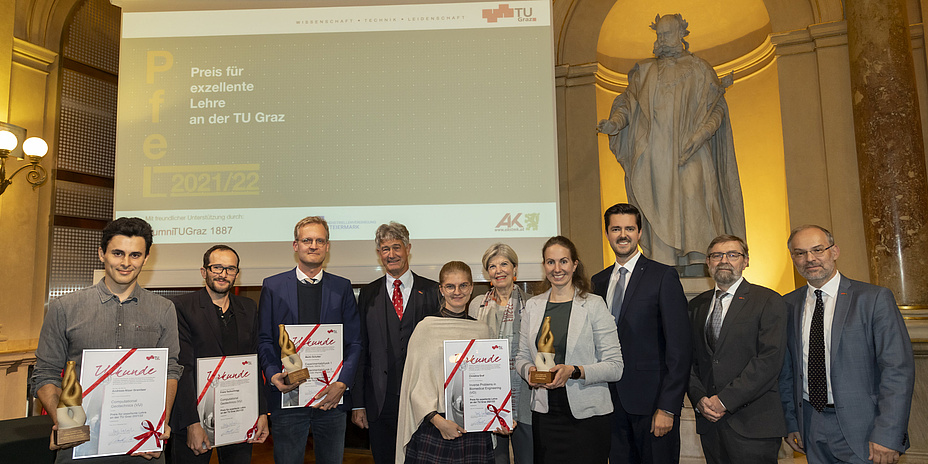TU Graz Gives Prizes to its Best Knowledge Mediators

In order to create new knowledge, humans must first acquire existing knowledge. For this to succeed, teaching is a crucial factor. It is precisely for this reason that TU Graz gives prizes to lecturers every two years for outstanding pedagogical and didactic achievements in imparting knowledge. In mid-November, the time had come again and the Awards for Excellence in Teaching 2021/2022 were given to five prizewinners at a festive event.
Excellence in teaching as basis for a successful future
Biomedical engineer Christina Graf, geotechnical engineers Franz Tschuchnigg and Andreas-Nizar Granitzer, and experimental physicists Martin Schultze and Roland Lammegger received prizes and a newly designed trophy as well as 2000 euros in prize money. Christina Graf had given her excellent lecture and integrated exercises as a virtual joint online lecture with Kerstin Hammernik from TU Munich, who was also present at the awards ceremony. Since the prizes for excellence in teaching are only awarded to teaching staff at TU Graz, Kerstin Hammernik received a gift as a sign of recognition.
“Excellence in teaching at universities is the basis for the successful future of students and for the innovative strength and performance of a country. It is therefore important for us to award particularly successful and motivated teaching concepts and to honour outstanding teachers as role models. After all, excellence in teaching requires great commitment, lots of personal involvement and a great deal of time from the lecturers,” says Stefan Vorbach, Vice Rector for Academic Affairs at Graz University of Technology (TU Graz).
The 2021/2022 prize winners and their courses
Christina Graf
Inverse Problems in Biomedical Engineering
Both Christina Graf and her co-lecturer colleague from TU Munich, Kerstin Hammernik, conduct research in various areas of magnetic resonance. It was important to them to show the parallels between current research and the lecture. Altogether 81 students from 13 universities from six countries in five different time zones took part in the “Inverse problems in biomedical engineering” course. Despite this physical distance, there was good cooperation between the international teams. The students liked the practical application and state-of-the-art research for machine learning and mathematical methods in biomedical engineering.
Franz Tschuchnigg and Andreas-Nizar Granitzer
Computational Geotechnics
Franz Tschuchnigg and Andreas-Nizar Granitzer took the challenges of the Covid pandemic in teaching as an opportunity to further develop the educational concept of the course “Computational geotechnics” in a holistic way. In doing so, they provided their traditionally heterogeneous student body with a high-quality, interdisciplinary learning experience despite unfamiliar conditions. Among other things, they won over their students with their authenticity and enthusiasm as well as the open-ended tasks that promote the spirit of innovation.
Martin Schultze and Roland Lammegger
Experimental Physics 1 & 2
Martin Schultze and Roland Lammegger see conveying enthusiasm and arousing interest for the subject and the teaching content in their courses “Experimental physics 1 & 2” as by far the most important element of teaching. They try to do this by creating links to current issues and explicitly encouraging questions. In addition, they link the intellectual grasp of the contents with an experiential approach through demonstrational experiments. The active involvement of the students in the experiments further solidifies this connection. After the lecture, Martin Schultze and Roland Lammegger also invite students to inspect the experimental set-ups and discuss them in order to break down communication barriers.
How the prizes are allocated
Before the winners can enjoy their individual prizes for excellence in teaching, they and their courses have to overcome a few hurdles. First, they have to be nominated. This can be done by students who have participated in the course, and by deans of studies and student representatives for their respective areas of responsibility. In addition, the course must comprise at least one semester hour per week, be held in the current semester of nomination and have been evaluated by at least five students during this period.
If the nomination has been successfully submitted, a formal check is carried out first. Afterwards, a selection committee chaired by Stefan Vorbach, Vice Rector for Academic Affairs, make their decision. Other members of the committee are representatives of the Students’ Union, the university management, the curricular committees, the Senate and external experts on the topic of university teaching. They also assess a digital questionnaire filled out by the nominees, which asks about formal aspects of the course as well as key aspects of excellence in teaching.
The prizes were donated by the Styrian Chamber of Labour, the Styrian Federation of Austrian Industries and TU Graz alumnus Dr. Odorich von Susani.
Kontakt
Manuela BERNER
TU Graz | Quality Management, Evaluation & Reporting
Tel.: +43 316 873 6004
E-Mail: lehrpreis@tugraz.at
Hannes MÜLLER
TU Graz | Higher Education and Programme Development
Tel.: +43 316 873 8553
E-Mail: lehrpreis@tugraz.at




